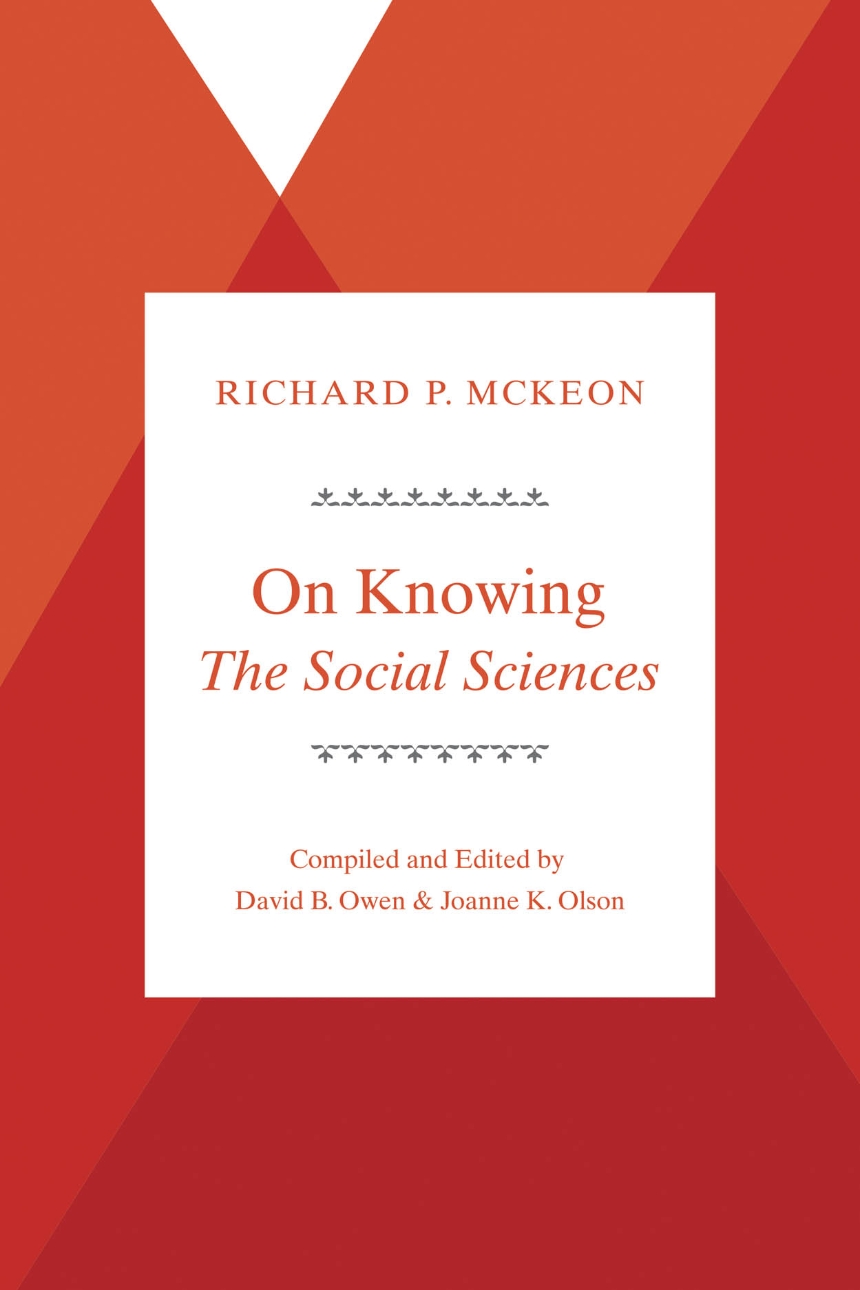On Knowing--The Social Sciences
As a philosopher, Richard McKeon spent his career developing Pragmatism in a new key, specifically by tracing the ways in which philosophic problems arise in fields other than philosophy—across the natural and social sciences and aesthetics—and showed the ways in which any problem, pushed back to its beginning or taken to its end, is a philosophic problem. The roots of this book, On Knowing—The Social Sciences, are traced to McKeon’s classes where he blended philosophy with physics, ethics, politics, history, and aesthetics.
This volume—the second in a series—leaves behind natural science themes to embrace freedom, power, and history, which, McKeon argues, lay out the whole field of human action. The authors McKeon considers—Hobbes, Machiavelli, Spinoza, Kant, and J. S. Mill—show brilliantly how philosophic methods work in action, via analyses that do not merely reduce or deconstruct meaning, but enhance those texts by reconnecting them to the active history of philosophy and to problems of ethics, politics, and history. The waves of modernism and post-modernism are receding. Philosophic pluralism is now available, fully formulated, in McKeon’s work, spreading from the humanities to the social sciences.
This volume—the second in a series—leaves behind natural science themes to embrace freedom, power, and history, which, McKeon argues, lay out the whole field of human action. The authors McKeon considers—Hobbes, Machiavelli, Spinoza, Kant, and J. S. Mill—show brilliantly how philosophic methods work in action, via analyses that do not merely reduce or deconstruct meaning, but enhance those texts by reconnecting them to the active history of philosophy and to problems of ethics, politics, and history. The waves of modernism and post-modernism are receding. Philosophic pluralism is now available, fully formulated, in McKeon’s work, spreading from the humanities to the social sciences.
480 pages | 65 line drawings, 34 tables | 6 x 9 | © 2017
History: History of Ideas
Philosophy: American Philosophy, History and Classic Works, Philosophy of Society
Political Science: Political and Social Theory
Reviews
Table of Contents
List of Figures and Tables
Foreword
Lecture 1 Philosophic Problems in the Social Sciences
Lecture 2 Freedom: Method
Discussion. Hobbes
Part 1 Leviathan, Part I, Chapter XIV
Part 2 Leviathan, Part I, Chapter XIV; Part II, Chapter XXI; Philosophical Rudiments Concerning Government and Society, Chapter XIV
Lecture 3 Freedom: Interpretation
Lecture 4 Freedom: Principle
Discussion. Spinoza
Part 1 Ethics, Books I–IV
Part 2 Ethics, Book V
Part 3 Tractatus Theologico-Politicus, Chapter IV
Part 4 Tractatus Theologico-Politicus, Chapter XVI
Lecture 5 Freedom: Selection
Lecture 6 Freedom: Selection (Part 2)
Discussion. Kant
Part 1 Fundamental Principles of the Metaphysics of Morals, Preface
Part 2 Fundamental Principles of the Metaphysics of Morals, First Section
Part 3 Fundamental Principles of the Metaphysics of Morals, First Section; Second Section
Part 4 Fundamental Principles of the Metaphysics of Morals, Second Section; Third Section
Lecture 7 Power: Selection and Interpretation
Lecture 8 Power: Interpretation (Part 2) and Method
Discussion. Mill, On Liberty
Part 1 On Liberty, Chapter I
Part 2 On Liberty, Chapter II
Part 3 On Liberty, Chapter II
Part 4 On Liberty, Chapters III–IV
Lecture 9 Power: Method (Part 2)
Lecture 10 Power: Principle; and History: Interpretation
Discussion. Machiavelli
Part 1 The Prince
Part 2 Discourses on the First Ten Books of Titus Livius
Lecture 11 History: Method and Principle; and Conclusion
Discussion. Review
Appendix A: Class Schedule
Appendix B: List of Names
Appendix C: One Alternate Introduction to the Course
Appendix D: Schema of Philosophic Semantics
Appendix E: Reading Selections from Hobbes’s Leviathan and Philosophical Rudiments Concerning Government and Society
Appendix F: Kant, Fundamental Principles: Three Editions with Major Sections’ Pagination
Appendix G: Mill, On Liberty: Four Editions with Major Sections’ Pagination
Appendix H: McKeon Notes on Freedom and History
Appendix I: Final Examination
Appendix J: Semantic Profiles of Selected Western Thinkers
Appendix K: Alternative Definitions of Freedom, Power, and History
Notes
Index
Foreword
Lecture 1 Philosophic Problems in the Social Sciences
Lecture 2 Freedom: Method
Discussion. Hobbes
Part 1 Leviathan, Part I, Chapter XIV
Part 2 Leviathan, Part I, Chapter XIV; Part II, Chapter XXI; Philosophical Rudiments Concerning Government and Society, Chapter XIV
Lecture 3 Freedom: Interpretation
Lecture 4 Freedom: Principle
Discussion. Spinoza
Part 1 Ethics, Books I–IV
Part 2 Ethics, Book V
Part 3 Tractatus Theologico-Politicus, Chapter IV
Part 4 Tractatus Theologico-Politicus, Chapter XVI
Lecture 5 Freedom: Selection
Lecture 6 Freedom: Selection (Part 2)
Discussion. Kant
Part 1 Fundamental Principles of the Metaphysics of Morals, Preface
Part 2 Fundamental Principles of the Metaphysics of Morals, First Section
Part 3 Fundamental Principles of the Metaphysics of Morals, First Section; Second Section
Part 4 Fundamental Principles of the Metaphysics of Morals, Second Section; Third Section
Lecture 7 Power: Selection and Interpretation
Lecture 8 Power: Interpretation (Part 2) and Method
Discussion. Mill, On Liberty
Part 1 On Liberty, Chapter I
Part 2 On Liberty, Chapter II
Part 3 On Liberty, Chapter II
Part 4 On Liberty, Chapters III–IV
Lecture 9 Power: Method (Part 2)
Lecture 10 Power: Principle; and History: Interpretation
Discussion. Machiavelli
Part 1 The Prince
Part 2 Discourses on the First Ten Books of Titus Livius
Lecture 11 History: Method and Principle; and Conclusion
Discussion. Review
Appendix A: Class Schedule
Appendix B: List of Names
Appendix C: One Alternate Introduction to the Course
Appendix D: Schema of Philosophic Semantics
Appendix E: Reading Selections from Hobbes’s Leviathan and Philosophical Rudiments Concerning Government and Society
Appendix F: Kant, Fundamental Principles: Three Editions with Major Sections’ Pagination
Appendix G: Mill, On Liberty: Four Editions with Major Sections’ Pagination
Appendix H: McKeon Notes on Freedom and History
Appendix I: Final Examination
Appendix J: Semantic Profiles of Selected Western Thinkers
Appendix K: Alternative Definitions of Freedom, Power, and History
Notes
Index
